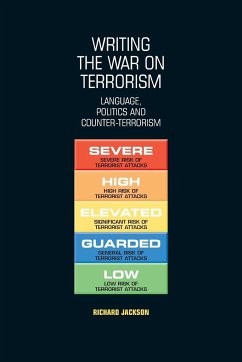- Broschiertes Buch
- Merkliste
- Auf die Merkliste
- Bewerten Bewerten
- Teilen
- Produkt teilen
- Produkterinnerung
- Produkterinnerung
This book examines the language of the war on terrorism. It is essential reading for anyone wanting to understand how the Bush administration's approach to counter-terrorism became the dominant policy paradigm in American politics today. -- .
This book examines the language of the war on terrorism. It is essential reading for anyone wanting to understand how the Bush administration's approach to counter-terrorism became the dominant policy paradigm in American politics today. -- .
Hinweis: Dieser Artikel kann nur an eine deutsche Lieferadresse ausgeliefert werden.
Hinweis: Dieser Artikel kann nur an eine deutsche Lieferadresse ausgeliefert werden.
Produktdetails
- Produktdetails
- New Approaches to Conflict Analysis
- Verlag: Manchester University Press
- Seitenzahl: 242
- Erscheinungstermin: 3. September 2012
- Englisch
- Abmessung: 234mm x 156mm x 13mm
- Gewicht: 404g
- ISBN-13: 9780719071218
- ISBN-10: 0719071216
- Artikelnr.: 22324952
- Herstellerkennzeichnung
- Books on Demand GmbH
- In de Tarpen 42
- 22848 Norderstedt
- info@bod.de
- 040 53433511
- New Approaches to Conflict Analysis
- Verlag: Manchester University Press
- Seitenzahl: 242
- Erscheinungstermin: 3. September 2012
- Englisch
- Abmessung: 234mm x 156mm x 13mm
- Gewicht: 404g
- ISBN-13: 9780719071218
- ISBN-10: 0719071216
- Artikelnr.: 22324952
- Herstellerkennzeichnung
- Books on Demand GmbH
- In de Tarpen 42
- 22848 Norderstedt
- info@bod.de
- 040 53433511
Richard Jackson is the author of fifteen books of poetry including Where the Wind Comes From (Kelsay Books, 2021) and Broken Horizons (Press 53, 2018) and twelve books of essays, interviews, translations and anthologies. Other books include: Take Five (Finishing Line, with four other poets, 2019), Traversings (Anchor and Plume, 2016) Retrievals (C&R Press, 2014), Out of Place (Ashland, 2014), Resonancia (Barcelona, 2014, a translation of Resonance from Ashland, 2010), Half Lives: Petrarchan Poems (Autumn House, 2004), Unauthorized Autobiography: New and Selected Poems (Ashland, 2003), and Heartwall (UMass, Juniper Prize 2000), as well as four chapbook adaptations from Pavese and other Italian poets, and a chapbook of prose poems, Fifties. The Heart's Many Doors is an anthology of poems by American poets on the artists Metka Kräovec (Wings Press, 2017). He has translated a book of poems by Alexsander Persolja (Potvanje Sonca / Journey of the Sun) (Kulturno Drustvo Vilenica: Slovenia, 2007) as well as Last Voyage, a book of translations of the early-twentieth-century Italian poet, Giovanni Pascoli, (Red Hen, 2010). In addition, he has edited the selected poems of Slovene poet, Iztok Osijnik. He was awarded the Order of Freedom Medal for literary and humanitarian work during the Balkan wars by the President of Slovenia during his work with the Slovene-based Peace and Sarajevo Committees of PEN International. He has received Guggenheim, Fulbright, NEA, NEH, and two Witter-Bynner fellowships, a Prairie Schooner Reader's Choice Award, the Crazyhorse Prize in Poetry; he is the winner of five Pushcart Prizes and has appeared in Best American Poems as well as many other anthologies. His poems have been translated into nineteen languages including books in Slovenia and Barcelona. His books and chapbooks have won numerous awards including the Juniper Prize, Maxine Kumin Award, Cleveland State Poetry Prize, Choice Award, Agee Award and others. He has given hundreds of readings and lectures in the United States and abroad, from Hong Kong to India to Israel and eastern Europe. He has taught at the Iowa Summer Festival, The Prague Summer Workshops, and regularly at UT-Chattanooga (since 1976), where he directs the Meacham Writers' Conference. He has taught at Vermont College of Fine Arts since 1987, winning teaching awards at both schools. In 2009 he won the AWP George Garret Award for teaching and writing.He also edited over twenty chapbooks of poems from Eastern Europe. His own poems have been translated into seventeen languages including Worlds Apart: Selected Poems in Slovene. He has edited three anthologies of Slovene poetry and Poetry Miscellany, a journal. He is the author of Dismantling Time in Contemporary American Poetry (Agee Prize), and Acts of Mind: Interviews with Contemporary American Poets (Choice Award). Originator of Vermont College of Fine Arts's Slovenia Program, he was a Fulbright Exchange poet to former Yugoslavia and returns to Europe each year with groups of students. Thanks to Terri who is my best reader, wife and friend, and to Laura Graves, Michael Beard, Seth Courtad and Hannah Ritter for help in preparing this, to my students at the University of Tennessee at Chattanooga for years of engaging conversation and new ideas, and the students and faculty at Vermont College of Fine Arts and who continue to inspire me. Also thanks for the support of the University of Tennessee at Chattanooga for its generous support over the years.
Introduction: Language and politics 1. Analysing the language of
counter-terrorism 2. Writing September 11, 2001 3. Writing identity: Evil
terrorists and good Americans 4. Writing threat and danger 5. Writing the
good (new) war on terrorism 6. Language and power: Reproducing the
discourse Conclusion: Politics, violence and resistance Final thoughts
Appendix: Official texts
counter-terrorism 2. Writing September 11, 2001 3. Writing identity: Evil
terrorists and good Americans 4. Writing threat and danger 5. Writing the
good (new) war on terrorism 6. Language and power: Reproducing the
discourse Conclusion: Politics, violence and resistance Final thoughts
Appendix: Official texts
Introduction: Language and politics 1. Analysing the language of
counter-terrorism 2. Writing September 11, 2001 3. Writing identity: Evil
terrorists and good Americans 4. Writing threat and danger 5. Writing the
good (new) war on terrorism 6. Language and power: Reproducing the
discourse Conclusion: Politics, violence and resistance Final thoughts
Appendix: Official texts
counter-terrorism 2. Writing September 11, 2001 3. Writing identity: Evil
terrorists and good Americans 4. Writing threat and danger 5. Writing the
good (new) war on terrorism 6. Language and power: Reproducing the
discourse Conclusion: Politics, violence and resistance Final thoughts
Appendix: Official texts

